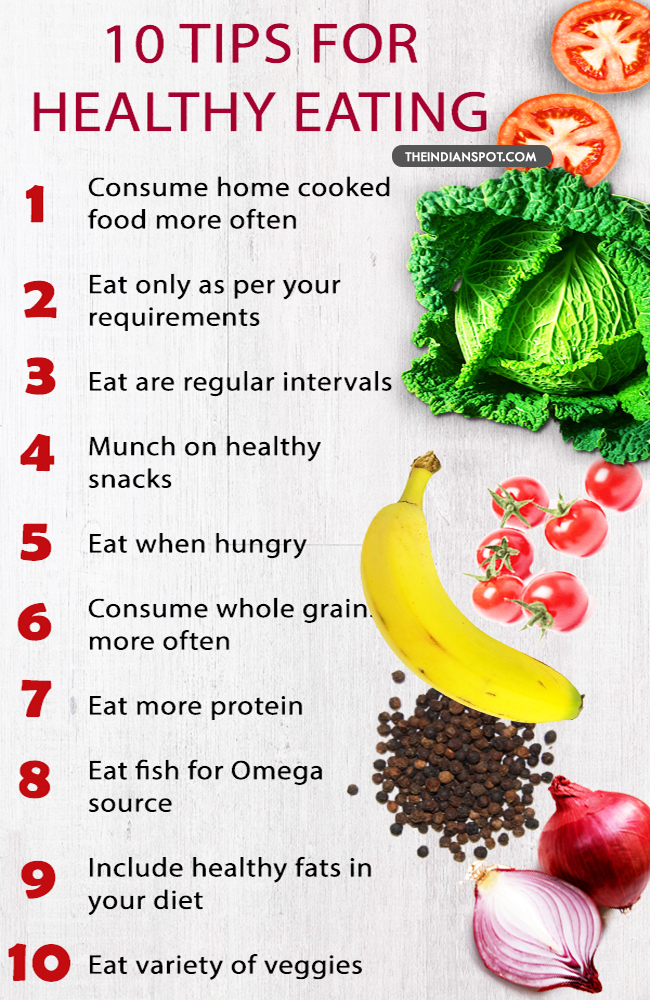Being healthy is a top concern these days, thanks to self-realisation and awareness about staying fit. If you are planning to stay healthy or don’t know how to start, here are top 10 things you need to know and incorporate in your life accordingly:

- HOME COOKING
Home cooked food is the best as it has the entire vital nutrient in its complete form compared to the processed food. Processed food has nutrient in them but in a very low percentage which is not adequate for required daily intake. Also processed food has many other ingredients which are not required by our body. They will have long term effects on our body if consumed regularly. The best advice is to often eat home food and avoid processed foods.
- EAT AS PER YOUR REQUIREMENTS
Our body has a particular threshold depending upon the goals we set or for those who done have particular goals as such it depends upon a person’s weight and daily calories burnt. On an average a person should consume 2000 calories, which should come from good source of food and should be consumed as per the goals requirements. Extra consumption beyond requirement will lead to health issues such as cholesterol problems, high/low BP and other effects as body will not understand on what to do with those extra macro nutrients supplied to the body.
- EAT AT REGULAR INTERVALS
The body has a limit of how much amount of nutrients to absorb in particular time period. If consumed too much at time, all the body will do is flush it out. This happens with the essential micro nutrients that we consume. It is ideally recommended to have small meals every 3 hours. The meals should contain only good sources of carb and nutrients and protein. If consumed higher than the requirements (decided by goals) it will be flushed out.
- PLAN HEALTHY SNACKS
People have a misconception about snacks. For them snack is all about consuming junk. But actually snack needs to be full of nutrients only and no bad fat at all. Peanut butter with banana and cinnamon powder makes a great snack. 25 CLEAN EATING SNACKS
- EAT WHEN YOU ARE HUNGRY
Plan your meals according to your hunger interval history. Ideally it should have a 3 hours gap.
- EAT A VARIETY OF VEGETABLES
Consuming only 1 type of food daily will make your body feel lack of nutrients. Eating a variety of vegetables will complete your nutrients requirement profile as well as fibre of different type makes your metabolism perfect.
- EAT WHOLE GRAINS MORE OFTEN
Life style now a day is less of hardship. We do not require instant energy all the time. Our body needs slow digesting carbs. Listen to your body. Eating whole grains will maintain your energy level for a longer time. Eating simple carbs will make your body loaded with instant energy where as your body is not working in order to consume it, making your body to ask to store that excess in your body as belly fat. OVERNIGHT BREAKFAST OATMEAL RECIPES
- INCLUDE A WHOLE LOT OF PROTEIN SOURCE
We essentially need a complete profile of protein for muscle building and maintaining it. Even though we are not working out our body does shed and repair muscle every time, and not providing good protein source will make your body eat up your muscles which is not a desirable condition for anyone. Hence include legumes like beans, chickpeas, lentils, nuts and seeds more often to give your body a complete nutrient profile.
- EAT FISH
Omega 3 is essential for our heart. It contains EPA and DHA. These essential fatty acids lower our cholesterol level making our heart healthy. Twice a week fish is a must.
- HEALTHY FATS
Venom is used to cure venom; in similar fashion healthy fats are used to get rid of the excess fat we have. CLA (Conjugated Linoleic Acid) an important fatty acid which we get from milk helps develop lean body. Other healthy fats can be found in flax seeds, olive oil, and nuts. All needs to be consumed in a fashion which is as per a person’s goals. It’s healthy which doesn’t imply that it should be consumed in excess. Eat as per calorie requirement and goals.